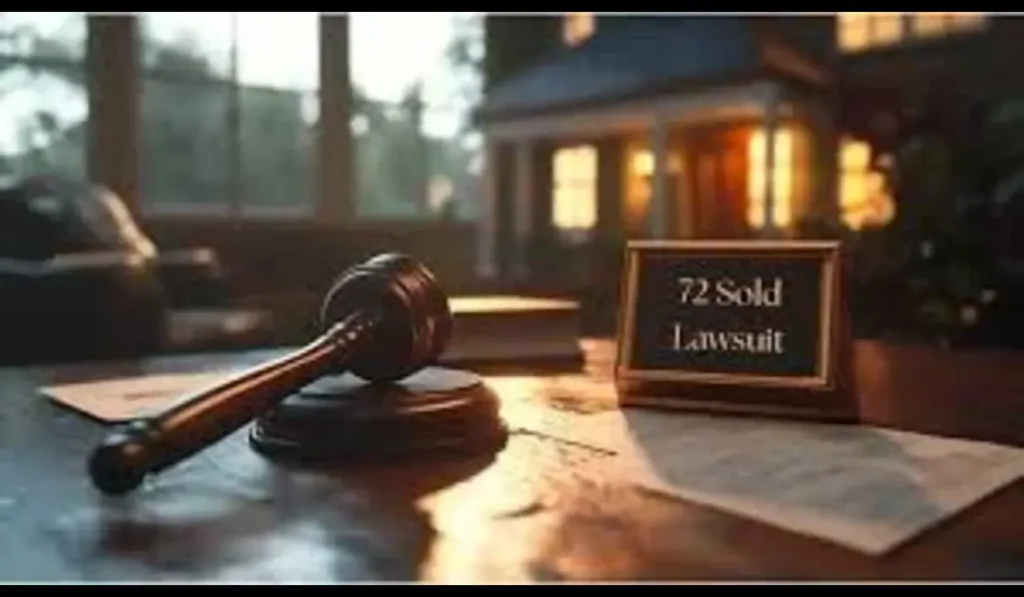72 Sold is a real estate marketing program that has gained popularity across the United States for its innovative approach to selling homes faster. However, the company faced legal issues when it became the subject of a lawsuit. This article explores the 72 Sold lawsuit in detail, the allegations, updates on the case, and what the settlement involved. Whether you are a real estate agent, a potential home seller, or simply interested in legal cases within the real estate industry, this breakdown will give you a clear understanding of the 72 Sold lawsuit.
Background of 72 Sold and Its Business Model
What is 72 Sold?
72 Sold is a real estate marketing and sales program that promises to sell homes within 72 hours. The concept quickly attracted attention, mainly because of its unique sales strategies, which include pre-marketing properties, creating urgency among buyers, and utilizing data-driven approaches. By following this model, 72 Sold achieved rapid growth and brand recognition across various U.S. markets.
Why Did 72 Sold Face Legal Challenges?
While 72 Sold’s business approach was successful in attracting customers and producing results, it also stirred some controversy. A lawsuit was filed against 72 Sold due to claims that the company’s marketing techniques were deceptive or potentially misleading. Several parties argued that the promises made by 72 Sold did not always hold up, which led to dissatisfied customers and increased scrutiny on the company’s practices. The lawsuit accused 72 Sold of using potentially misleading marketing techniques to lure sellers.
Details of the 72 Sold Lawsuit
Key Allegations Against 72 Sold
The primary focus of the lawsuit was on 72 Sold’s claims of selling homes faster than traditional real estate methods. The accusations centered around:
- Misleading Marketing Claims: The lawsuit claimed that 72 Sold’s promises of selling homes in 72 hours were exaggerated, suggesting the program did not perform as effectively as advertised.
- False Advertising: Another significant allegation was that the company’s advertising techniques were designed to mislead homeowners about the speed and success rate of sales, thereby causing clients to choose their services under false pretenses.
- Unfair Competition: Traditional real estate agents argued that 72 Sold’s marketing misrepresented the real estate market’s ability to produce quick sales, giving the company an unfair advantage over other agents who followed standard practices.
These accusations led to legal scrutiny, as the plaintiffs alleged that the company’s methods were not only misleading but potentially detrimental to homeowners who chose the program with unrealistic expectations.
Legal Proceedings: How the Case Unfolded
The 72 Sold lawsuit progressed through various stages, with plaintiffs and defendants presenting evidence to support their claims. The defendants argued that their marketing strategies were within the boundaries of the law, asserting that their unique selling proposition was based on actual data and positive outcomes for many clients. However, the plaintiffs maintained that the marketing practices created unrealistic expectations, causing potential harm to the real estate market as a whole.
72 Sold Lawsuit Update: Recent Developments
Court Findings and Settlement Discussions
As the case moved forward, the court analyzed both sides’ arguments in detail. To avoid a prolonged legal battle, settlement discussions were also explored as a potential resolution. These discussions focused on compensating any parties that might have been misled by the marketing techniques, along with any fines or changes to the company’s advertising methods.
Final Settlement for the 72 Sold Lawsuit
Eventually, a settlement was reached between 72 Sold and the plaintiffs. The settlement involved:
- Compensation: A fund was set up to compensate homeowners who claimed to be misled by the program’s advertising.
- Marketing Adjustments: 72 Sold agreed to revise its marketing language to avoid creating unrealistic expectations. This step ensured that customers had a clearer understanding of what to expect when using 72 Sold’s services.
- Legal Fees and Costs: Part of the settlement included covering the legal costs for both parties involved in the case.
Impact on 72 Sold’s Business Practices
Following the lawsuit, 72 Sold had to adopt changes to its business practices. The company modified its marketing materials to provide more transparent information about the service and its expectations. This step has been seen as a positive move toward maintaining trust with its clientele and remaining compliant with legal standards.
What Was the Settlement for the 72 Sold Lawsuit?
The settlement in the 72 Sold lawsuit addressed multiple aspects to prevent future misunderstandings between the company and its clients. It provided financial compensation to affected customers and required adjustments in the company’s advertising strategies to avoid future lawsuits.
The settlement highlighted the importance of transparent marketing practices, especially in industries like real estate, where trust and accuracy are crucial to attracting and retaining customers.
Lessons Learned from the 72 Sold Lawsuit
1. The Importance of Transparent Advertising
For any business, especially in high-stakes industries like real estate, transparent advertising is essential. The 72 Sold lawsuit underscored the risks associated with making bold claims that may not be achievable for every customer. Clear communication and well-supported claims help prevent misunderstandings and build a lasting reputation.
2. Legal Compliance in Marketing Practices
This lawsuit also demonstrated how crucial it is for companies to stay within the legal boundaries of marketing. Companies need to be careful about the claims they make, ensuring that they can back them up with evidence. By adhering to legal marketing practices, companies can avoid costly lawsuits and maintain positive relationships with their clients.
3. Impact on Industry Standards
The 72 Sold lawsuit served as a cautionary tale for the entire real estate industry. It highlighted the need for all real estate companies to consider the ethics and legality of their advertising. Since consumers rely heavily on real estate agents’ claims, misleading information can have lasting negative effects on both customers and the market as a whole.
72 Sold Lawsuit Update: Where Does the Company Stand Now?
Since the lawsuit, 72 Sold has continued to operate with a few adjustments to its business practices. The company has revised its marketing materials to set realistic expectations for potential customers, focusing on honesty and transparency. These changes have allowed 72 Sold to move forward positively, focusing on building trust with customers and offering a competitive service.
Frequently Asked Questions (FAQs)
1. What Was the 72 Sold Lawsuit About?
The 72 Sold lawsuit was about allegations that the company misled customers through its marketing practices. Plaintiffs claimed that the company’s promise to sell homes within 72 hours was exaggerated, causing unrealistic expectations.
2. What Was the Settlement for the 72 Sold Lawsuit?
The settlement involved compensation for affected customers, adjustments in 72 Sold’s advertising methods, and coverage of legal costs. These changes aimed to provide more transparency in the company’s marketing.
3. Is 72 Sold Still Operating After the Lawsuit?
Yes, 72 Sold is still in operation. The company has made adjustments to its marketing practices to align with the settlement requirements, ensuring clearer communication with clients.



